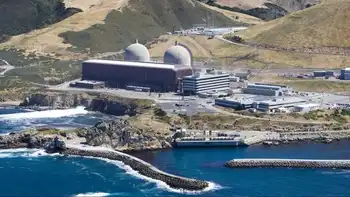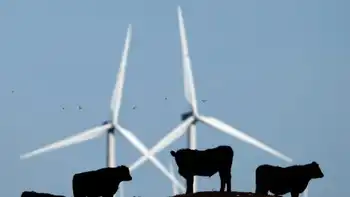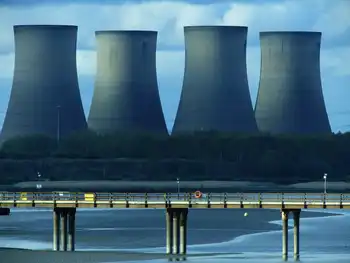Turning black coal green
By Cincinnati Enquirer
Protective Relay Training - Basic
Our customized live online or in‑person group training can be delivered to your staff at your location.

- Live Online
- 12 hours Instructor-led
- Group Training Available
American pension and mutual fund money is being invested in the Chinese coal industry, which is lucrative but has a poor record for pollution and worker safety.
Look no further than China Shenhua Energy Co., the Beijing giant that produces about 170 million tons of coal a year from 21 mines and builds power plants. While about 80 percent of the companyÂ’s stock is owned by Shenhua Group in Beijing, the rest of its shareholders reads like a whoÂ’s who of U.S. investors: Fidelity Investments, OppenheimerFunds, Merrill Lynch, even the Teachers Retirement System of Texas.
The performance of Shenhua’s Hong Kong-listed shares explains why U.S. investors love Chinese coal. Shenhua gained almost 65 percent from July through September, while Peabody – a favorite of analysts who follow U.S. coal companies – lost more than 3 percent over the same period. Shenhua’s initial public offering in Shanghai in September raised $8.9 billion, a record for mainland China.
U.S. investment in the likes of Shenhua has gone largely unnoticed. Individual investors such as the retired Texas teachers probably donÂ’t know their money is going into Chinese coal stocks, says corporate government expert Nell Minow.
But while such companies might come with concerns, investors find poor returns equally upsetting, she adds.
“You’re really on the horns of a dilemma,” she says. “You can’t afford not to be in China.”
A spokesman for the Texas pension fund declined to comment.
Even environmental groups that have criticized the U.S. coal industry for practices such as mountaintop-removal mining have been largely silent on investing in Chinese coal. The Rainforest Action Network, for instance, focused on the U.S. in its criticism of Citigroup Inc. and Bank of America Corp.Â’s involvement with the coal industry.
“We’ve predominantly been looking at the recent boom in coal-fired power plants domestically,” said Matt Leonard, a global finance campaigner for the group, who added that Chinese coal should be targeted as well. “We’re working to get the banks out of all coal development.”
Apart from investors, U.S. coal companies are also salivating over China because of the promise of things they havenÂ’t seen much of lately: Rising prices and the opportunity to increase exports.
Massey Energy Co. of Richmond, Va., and International Coal Group of Scott Depot, W.Va., recently told investors they plan to increase metallurgical coal production to take advantage of rising world demand caused by ChinaÂ’s transition from a coal exporter to an importer this year. And St. Louis-based Peabody spent $1.51 billion last year to buy its way back into Australia, a country it left several years ago, to export to China.
“In general, they’re doing a very smart thing,” said Mike Tian, an analyst with independent investment research company Morningstar. “That’s where the money is.”
Companies in Kentucky, the nationÂ’s third-ranked producer of coal, are also trying to figure out how they can capitalize on ChinaÂ’s demand for coal, said Cathy Chao, a trade specialist with the International Trade Division within the state Cabinet for Economic Development.
She said several Kentucky coal companies are preparing to go on a trade mission to China. “Most likely they will take a look at the market and see what opportunities there are,” she said.
The most recent U.S. government data illustrates the lure of China clearly. Exports from the U.S. – the third-largest exporter of metallurgical coal in the world – were up 25 percent from 2002 through 2006, and an estimated 19 percent just through July.
“There will be opportunities for U.S. metallurgical coal companies to export more,” said Jim Truman, who follows the coal industry for consulting firm Hill & Associates.
Iron ore pellet maker Cleveland-Cliffs Inc. recently jumped into the coal business, buying West Virginia and Alabama mine operator PinnOak Resources. Cleveland-Cliffs said the $610 million purchase is squarely aimed at exporting metallurgical-grade coal. Peabody has gone a step further and opened a business development office in China.
The National Mining AssociationÂ’s Leslie Coleman said both companies are positioning themselves to be bigger players in the metallurgical coal businesses because of the demand coming from China and the rest of Asia. Metallurgical coal is used to make coke, a fuel.
Faced with increasing opposition from environmental groups, U.S. coal companies have begun pushing technology designed to reduce pollutants, including the greenhouse gas carbon dioxide. TheyÂ’ve also been working with electricity producer China Huaneng Group on FutureGen. The planned $1.5 billion experimental coal-fired power plant would serve to test carbon capture and underground storage, among other things.
Cal Kent, who follows the industry at Marshall UniversityÂ’s Center for Business and Economic Research, sees the beginning stages of U.S. coal companies trying to turn into global companies.
“Where markets are growing, you want to be near them,” Kent said. “It’s generally good in a global market to be a global company.”











